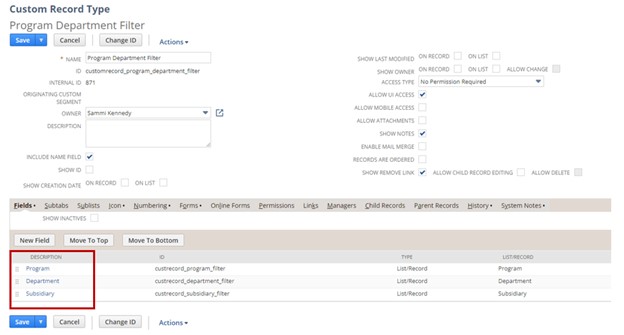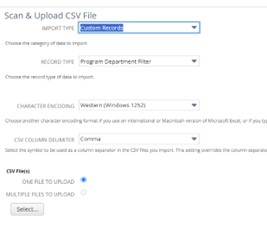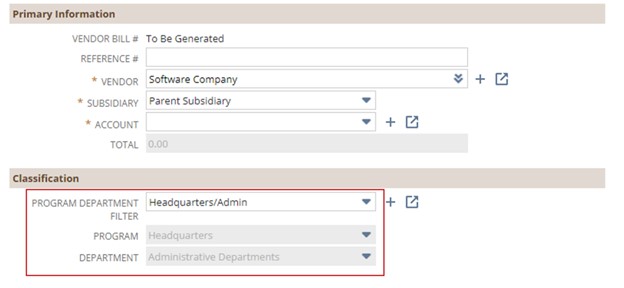Custom Records
Custom records in NetSuite can assist organizations in organizing and utilizing information that cannot be done through native transaction or entity record types. Custom record types create a custom table in NetSuite are used to collect information specific to the needs of your organization. Custom records can be used to build a multi-level relationship between disparate records, ultimately helping users populate information more efficiently for transactions and entity records. This blog will walk users through how custom records can streamline the vendor bill process. This customization will allow users to select one field that will populate multiple fields on a transaction record.
First, users will need to create a custom record type. Below, we have created a custom record type titled ‘Program Department Filter’. This record type will be used on a vendor bill as a short cut key. After this custom record value is selected, the corresponding program and department fields will populate on the transaction based on field sourcing from the custom record. The following custom fields have been created for this record type:
- Program – this value will be used to populate the program on the transaction, this will be a custom field that will utilize the Program List/Record Type.
- Department – this value will be used as the department on the transaction, this will be a custom field that will utilize the Department List/Record Type.
- Subsidiary – this value will be used to filter the program/department field by the subsidiary selected on the transaction, this will be a custom field that will utilize the Subsidiary List/Record Type.

Users will also need to populate the custom record with values. Users can do this through the user interface or through CSV import.
Custom Record through User Interface
- Navigate to the custom record created and click list, Click ‘New Program Department Filter’

- Populate field information including program, department, and subsidiary.

- Users can also click ‘Edit’ next to an already created record.


Custom Record through CSV Import
- A CSV import can create these records in bulk. The import type will be custom records and the record type will be the custom record created (Program Department Filter)

Next, a workflow will be utilized to set these fields after field edit. Users will need to create a custom field that uses the custom record list. In the example below, Program Department Filter field has been created and uses the List/Type record Program Department Filter (custom record). The field has been filtered using the source filter by subsidiary. This restricts the Program Department Filter field to only display the options when the transaction subsidiary matches the subsidiary on the custom record. transaction. Once the value is selected on a transaction, the program and department that correspond with the program department filter field will default.

In the above example, “Headquarters/Admin” has been selected. This has also set program and department to the values selected on the Program Department Filter custom record. This customization can be implemented to simplify the record creation process and fill out multiple fields based on one field selection.
In Conclusion:
This customization allows for more user friendly and efficient business processes. Some potential advantages of having fields defaulted in NetSuite include:
- Nonprofit organizations benefit from time savings as users will no longer have to enter repetitive information
- This customization can minimize data entry errors since users will only need to select one field
- Defaulting values increases consistency since the information will be standardized across records
To learn more about NetSuite custom records, please contact our team today!

 RSMUS.com
RSMUS.com




